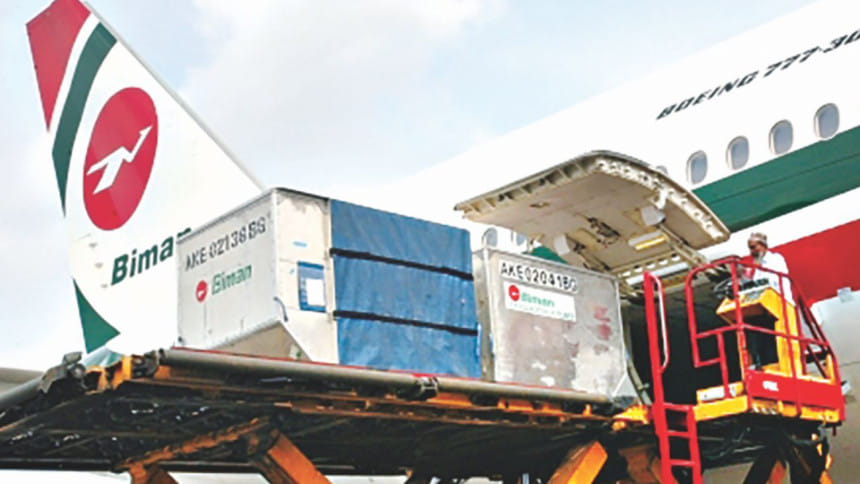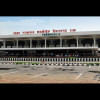Withdrawal of UK Ban: No cheers for Biman, in fact

Nearly three weeks after the UK government's withdrawal of the ban on Dhaka-London direct cargo flights, Bangladeshi exporters are yet to reap any benefit from the decision.
National flag carrier Biman, the only airline having direct flights from Dhaka to London, cannot yet operate such flights because of another ban, slapped by the European Union last year.
As for the international airlines, they still need to rescreen their UK-bound cargos originating from Dhaka at a third country's airport, like they have been doing since March 2016, when the UK ban came into effect.
This rescreening process costs Bangladeshi exporters an additional 10 to 20 cents, depending on the airlines, for shipping each kg of goods.
So the lifting of the British ban means little to Bangladeshi exporters as the EU ban remains in place.
The 28-nation bloc, which includes the UK, placed Bangladesh on the list of high-risk countries for cargo operations both by air and sea to the EU countries in June last year.
The EU ban came after Biman, also the country's air cargo-handler, failed to obtain a certificate (ACC3) for improved screening of cargos to ensure security and safety by 2016. That deadline was set in 2014.
The British government said Biman would be allowed to carry freights to London directly once it passed a compliance audit test of European standards.
The audit was complete on February 22, said Shakil Meraj, general manager of Biman's public relations.
“The audit found our performance to be satisfactory and we are expecting a positive result soon,” he told The Daily Star last night.
On February 18, the British High Commission in Dhaka and Bangladesh's civil aviation ministry announced that the nearly two-year-long ban on direct cargo flight has been withdrawn, keeping restrictions on Biman.
“We don't see any changes. Our exporters are still paying additional charges for rescanning their UK-bound goods,” said Kazi Wahidul Alam, editor of Bangladesh Monitor, an aviation journal.
Before the lifting of the ban, the UK and Europe-bound freights were shipped through foreign carriers, mainly through Middle Eastern airlines. These cargos were rescreened at the bases of these airlines before shipment to Europe.
“Such rescreening is still mandatory,” said Masum Hossain, managing director of Rider Cargo Ltd, a freight forwarder.
This requires an additional 8-12 hours. Because of this delay, the quality of perishable items such as vegetables are compromised, added Masum, also former deputy manager of Qatar Airways cargo in Dhaka.
Mohammad Abul Hossain, owner of Lee Enterprise, said airlines charged Tk 165 to carry each kg of vegetables when the UK ban was in place.
“The rate remains unchanged,” said Abul, who exports vegetables worth Tk 4 crore a year, mainly to the UK.
Contacted, a senior official of a Middle Eastern carrier said they sought directives from their headquarters about whether rescreening of freight would be required for UK-bound cargos from Dhaka.
Biman is among more than 30 airlines that carry cargo from Dhaka. Middle Eastern carriers -- Emirates, Saudia, Qatar -- carry more than half of the export freight of over 200,000 tonnes a year, according to a senior official of a United Arab Emirates-based airline in Dhaka.
Of the total air cargo export, 60-65 percent are shipped to the EU, including the UK. Most of them are garment items, but they also include fruits, vegetables and leather products.
Following the ban, Biman's cargo carriage declined to 33,542 tonnes in fiscal 2016-17 from 40,931 tonnes the previous year. Its revenue from cargo shipment fell 22 percent year-on-year to Tk 240 crore in fiscal 2016-17, according to Biman.
Soon after the ban, Bangladesh recruited British company Redline for screening of the export goods and training the airport staff on safety and security.
Bangladesh also installed the required number of Explosive Detection System and Explosive Detection Dog for cargo scanning to improve the safety and security.
In recent months, an independent team from the EU assessed the safety and security measures, and Bangladesh passed the validation test in November.
In addition to the EU ban, two other bans on direct cargo flights from Dhaka are also in place -- one imposed by Australia in December 2015 and the other by Germany in June 2016.
Contacted, Chairman of Civil Aviation Authority of Bangladesh Air Vice Marshal M Naim Hassan said exporters would get benefit once Biman started carrying cargos to London.
“Biman will start carrying direct cargos once it gets the clearance. We are waiting for that,” he told The Daily Star last night.

 For all latest news, follow The Daily Star's Google News channel.
For all latest news, follow The Daily Star's Google News channel. 







Comments